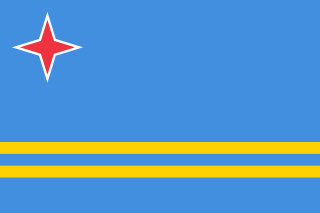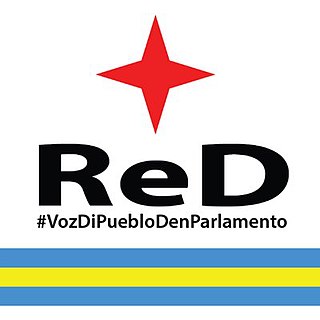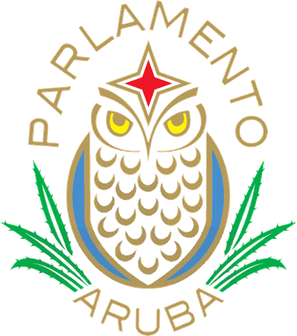
Aruba, officially the Country of Aruba, is a constituent country within the Kingdom of the Netherlands, in the southern Caribbean Sea 29 kilometres (18 mi) north of the Venezuelan peninsula of Paraguaná and 80 kilometres (50 mi) northwest of Curaçao. In 1986, it became a constituent country within the Kingdom of the Netherlands and acquired the formal name the Country of Aruba.

Politics of Aruba, a constituent country of the Kingdom of the Netherlands, takes place in a framework of a parliamentary representative democratic country, whereby the governor in his capacity as the King's representative is the de jure head of government and of a multi-party system. Executive power is exercised by the government. Federal legislative power is vested in both the government and the Parliament. The Judiciary is independent of the executive and the legislature. Aruba has full autonomy on most matters. Exceptions are defense, foreign affairs, and the Supreme Court. The constitution was enacted in 1986.

The following is an alphabetical list of topics related to the nation of Aruba.
The Aruba national football team is the national team of Aruba. It was founded in 1932 and is affiliated with the Caribbean Football Union (CFU), CONCACAF and FIFA and is controlled by the Arubaanse Voetbal Bond.

Aruba's Constitution was unanimously approved by all political parties represented in Aruba's Parliament on a January 1, 1986, and was proclaimed in the Afkondigingsblad van Aruba, No.26, 1985, on January 1, 1986.

Aruba elects a legislature on the national level. The Estates (Staten) have 21 members, elected for a four-year term by Open list Party-list proportional representation. Seats are distributed between parties that have gained at least one full quota using the Hagenbach-Bischoff system. Before obtaining the status as land (English: country in the Kingdom of the Netherlands, Aruba participated in elections for its Island Council and for the Aruba constituency of the parliament of the Netherlands Antilles.

The Aruban People's Party is a Christian-democratic political party in Aruba founded in 1942. AVP is an acronym for the Dutch name of the party.

The Aruban Patriotic Party is a political party in Aruba. It was founded in 1949.

The National Democratic Alliance is a political party in Aruba. At the 1985 Aruban general election, the party won 2 of the 21 seats, then won only 1 seat at the 1989 general election and the 1993 general election. They later lost their only seat at the 1994 general election and never gained any again.

The People's Electoral Movement is a social democratic political party in Aruba. Following the 2001 general election for the Parliament of Aruba the party won 52.4% of popular vote and 12 out of 21 seats. In the 2005 general election, the party won 43% of the popular vote and 11 out of 21 seats thus won the election and remained in power. In the 2009 general election, MEP lost 2 seats and won 36% of the vote, subsequently losing the election.

The prime minister of Aruba is de facto head of the executive branch of government. Together with Aruba's Council of Ministers, they form the executive branch of Aruban government.

Democratic Network is a progressive, green political party in Aruba. Since the 2017 Aruban general election it has one seat in the Estates of Aruba and is part of the government coalition under Prime Minister Evelyn Wever-Croes.

Real Democracy was a political party in Aruba.

The Parliament of Aruba is the unicameral legislature or parliament of Aruba. The parliament has 21 members, elected for a four-year term by proportional representation. Each member holds their seats until the parliament is dissolved, which is every four years by a general election. The leader of the party which gains a majority of seats usually becomes the prime minister.

The Arubaanse Voetbal Bond is the governing body of football in Aruba. Its headquarters are at Frans Figaroa sports complex in the city of Noord. It's a member of FIFA and is responsible for governing amateur and professional football, including the men's, and youth national teams. The AVB is also responsible for sanctioning referees and football tournaments for most football leagues in Aruba.

Aruba first competed at the Olympic Games in 1988, and has participated in each Summer Olympic Games since then. Aruba has yet to win any Olympic medals.
Gillain Berry is a Jamaican-Aruban model and beauty pageant titleholder who was crowned Miss Aruba 2010 on December 4, 2010, and represented her country in Miss Universe 2011 and Miss World 2011.

General elections were held in Aruba on 12 December 1997. The Aruban People's Party emerged as the largest party, winning ten of the 21 seats in the Estates.

General elections were held in Aruba on 29 July 1994. The Aruban People's Party (AVP) emerged as the largest party, winning ten of the 21 seats in the Estates. The AVP formed a coalition government with the Aruban Liberal Organization with Henny Eman as Prime Minister.

General elections were held in Aruba on 25 June 2021 to elect all 21 members of Parliament. The elections were originally scheduled to take place in September 2021, but were brought forward following the resignation of the government after a criminal investigation was opened against one of the governing coalition parties, Proud and Respected People, for embezzling government money.







